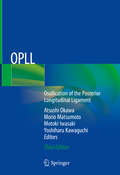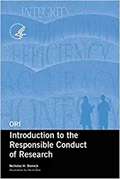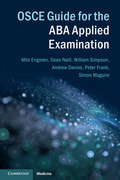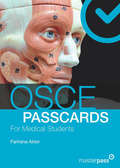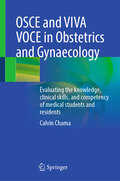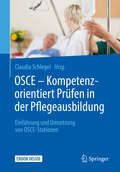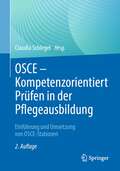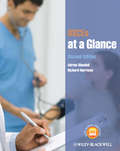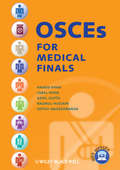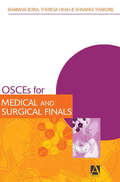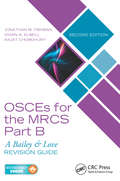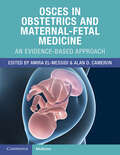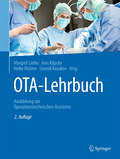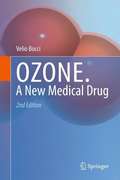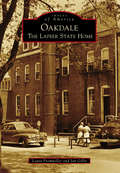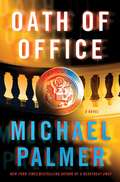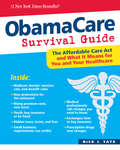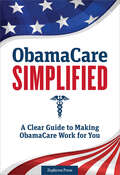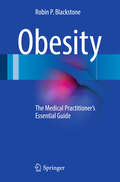- Table View
- List View
OP-Handbuch: Grundlagen, Instrumentarium, OP-Ablauf
by Margret Liehn Brigitte Lengersdorf Lutz Steinmüller Rüdiger DöhlerDas Standardlehrbuch für neue und erfahrene Pflegekräfte sowie für Operationstechnische Assistenten (OTA) bietet aktuelles und umfangreiches Wissen für die tägliche Arbeit im OP. Aufgrund ihrer Vielfältigkeit erfordert die Tätigkeit im OP ein hohes Maß an Flexibilität, vielseitige Kompetenzen und kontinuierliche Lernbereitschaft. Meistern Sie diese Herausforderungen und lernen Sie von den erfahrenen Autoren alle wesentlichen Grundlagen für ihre pflegerische Weiterbildung und die Praxis: Anatomie, Instrumentarium, Nahtmaterial, medizinische Geräte, Vor- und Nachbereitung der Operation und Lagerung. Auch die Themen Risikomanagement und Dokumentation werden fachspezifisch dargestellt.Die 7. Auflage wurde komplett bearbeitet, aktualisiert und um das Kapitel Transplantation und Explantation erweitert; das Kapitel zur "Kinderchirurgie" wurde neu geschrieben.
OPLL: Ossification of the Posterior Longitudinal Ligament
by Atsushi Okawa Morio Matsumoto Motoki Iwasaki Yoshiharu KawaguchiThis publication brings together information on all aspects of OPLL - epidemiology, etiology, diagnosis, and treatment. It contains contributions by Japanese researchers and surgeons, including members of the Ministry of Health and Welfare Investigation Committee, and by American surgeons with expertise in the field. Until now, little has been published on the subject in English. This collection of reports is amply augmented with illustrations.
ORI Introduction to the Responsible Conduct of Research
by Nicholas H. Steneck David ZinnThe ORI Introduction to the Responsible Conduct of Research draws together in a single, easy-to-read book the fundamentals of responsible research. Readers are guided through the complex world of regulations and best practices, from initial design through to publication. Each chapter is devoted to one of ORI’s nine core areas, include: research misconduct, human and animal research, data management, conflict of interest, collaboration, mentoring, authorship and peer review. <p><p> While it is often assumed that researchers learn responsible practices on the job, many do not. And unfortunately, sometimes what they learn on the job is misguided or wrong. The ORI Introduction to RCR provides an easy way for anyone from beginning undergraduate researcher to experienced postdoc, faculty member or industrial scientist to learn what society expects of them as professionals. Opening cases, study questions, and additional readings make this book ideal for classroom use. A series of original cartoons by artist David Zinn at the beginning of each chapter use humor as a way to engage the reader in this serious and vitally important topic. <p><p> This important and authoritative publication was created by the U.S. Government to further activities and support programs that enhance education in the responsible conduct of scientific research. It supplements existing resources by making a comprehensive overview of basic rules of the road for responsible research available to all Public Health Service funded researchers, with a special focus on the needs of small and mid-size research institution and beginning researchers in mind.
OSCE Guide for the ABA Applied Examination
by Andrew Davies Simon Maguire William Simpson Peter Frank Milo Engoren Sean NeillThe OSCE (Objective Structured Clinical Examination) component of the ABA Applied exam is a new concept that involves a number of 'live' practical stations in which candidates must demonstrate communication, professionalism and technical skills to the examiners. This book covers topics that are outlined in the ABA curriculum, presented in a way that emulates the OSCE exam setting, and will help candidates prepare for the exam and test their knowledge. Each station is constructed in clear, logical fashion to make the revision of individual topics more accessible. The sample questions and answers allow self-testing and are complemented by discussions, numerous illustrations and up-to-date clinical guidelines which follow modern-day anesthetic practice. The OSCE Guide for the ABA Applied Examination is a must-have resource which will help candidates further understand and prepare for the OSCE process.
OSCE PASSCARDS for Medical Students
by Farhana AkterMrs Smith was prescribed Flucloxacillin despite being penicillin allergic, and suffered an anaphylactic reaction. Her husband now wishes to speak to you. You were not present at the time and you are not sure of what happened, however, he demands to speak to you as you are a doctor and part of the team looking after her. What do you do? These 96 invaluable flashcards thoroughly test OSCE candidates on correct procedure for a wealth of topics from taking blood to managing advanced life support, scrubbing for theatre to breaking bad news. Each topic is presented in an easy-to-read table, detailing best practice, including pertinent questions, tests to perform, possible responses and suspected diagnoses. Expertly laid out, the small, A5 format makes for easy handling - ideal for revision and self-examination.
OSCE and VIVA VOCE in Obstetrics and Gynaecology: Evaluating the knowledge, clinical skills, and competency of medical students and residents
by Calvin ChamaThis textbook focuses on OSCE and VIVA VOCE assessments, fundamental for evaluating the knowledge, clinical skills, and competence of those pursuing a career in obstetrics and gynecology, ensuring that they are well-prepared to provide high-quality care to women.It covers the principles, construction, and examples of OSCE and VIVA VOCE exams.To facilitate the understanding of both examiners and candidates, the textbook includes numerous station examples and sample questions for oral examinations, offering valuable guidance throughout the assessment process.This resource is indispensable for consultants, resident obstetricians, and gynecologists in training institutions, specifically tailored to meet the needs of the African curriculum.
OSCE – Kompetenzorientiert Prüfen in der Pflegeausbildung: Einführung und Umsetzung von OSCE-Stationen
by Claudia SchlegelPflegepädagogen und Dozenten an Hochschulen und Ausbildungsstätten für Pflegeberufe finden hier konkrete Gestaltungsmöglichkeiten für die Umsetzung von Prüfungen nach der OSCE-Methode. „Objective Structured Clinical Examination“ (OSCE) ist eine Prüfungsform, bei der sich Lernende anhand von spezifischen Situationen mit dem Patienten und seiner Krankheitssituation auseinandersetzen. Der „Standardisierte Patient“ wird durch einen Schauspieler dargestellt, der mittels eines Drehbuchs seine Rolle ausfüllt. Diese vereinheitlichte Prüfungssituation kann die gesamte Handlungskompetenz, u.a. Fachwissen, Kommunikations- und Entscheidungsfähigkeit, des Lernenden abbilden.Das ideale Arbeitsbuch - inkl. ebook - zur Umsetzung von OSCE-Stationen mit Prüfungsaufgaben und Checklisten!
OSCE – Kompetenzorientiert Prüfen in der Pflegeausbildung: Einführung und Umsetzung von OSCE-Stationen
by Claudia SchlegelKompetenzorientiert Prüfen! Fachpersonen der Pflegepädagogik sowie Dozierende an Hochschulen und Ausbildungsstätten für Pflegeberufe finden in dieser Publikation konkrete Gestaltungsmöglichkeiten für die Umsetzung der OSCE-Prüfungsmethode. «Objective Structured Clinical Examination» (OSCE) ist eine Prüfungsform, bei der sich Lernende anhand von spezifischen Situationen mit erkrankten Personen und deren Angehörigen auseinandersetzen. «Standardisierte Personen» (SP) werden durch Schauspielende dargestellt, die mittels eines Drehbuchs ihre Rolle ausüben. Diese vereinheitlichte Prüfungssituation bildet die gesamte Handlungskompetenz, u.a. Fachwissen, Kommunikations- und Entscheidungsfähigkeit, der Lernenden ab.
OSCEs at a Glance
by Richard Harrison Adrian BlundellFollowing the familiar, easy-to-use at a Glance format, OSCEs at a Glance 2nd Edition is both a revision guide and a comprehensive introduction to objective structured clinical examinations for medical students.Fully revised to suit the current curriculum, and written with student feedback and experiences in mind, this full-colour textbook contains brand new and comprehensively indexed chapters which include 32 new OSCE stations, covering distinct areas of specialisation as well as broader practical and communication skills covered in the exams.This new edition of OSCEs at a Glance is also supported by a companion website at www.ataglanceseries.com/osces containing downloadable OSCE checklists - perfect for testing knowledge in the run-up to exams.
OSCEs for Medical Finals
by Akhil Gupta Sathiji Nageshwaran Iqbal Khan Hamed Khan Nazmul HussainOSCEs for Medical Finals has been written by doctors from a variety of specialties with extensive experience of medical education and of organising and examining OSCEs.The book and website package consists of the most common OSCE scenarios encountered in medical finals, together with checklists, similar to OSCE mark schemes, that cover all of the key learning points students need to succeed. Each topic checklist contains comprehensive exam-focussed advice on how to maximise performance together with a range of 'insider's tips' on OSCE strategy and common OSCE pitfalls.Designed to provide enough coverage for those students who want to gain as many marks as possible in their OSCEs, and not just a book which will ensure students 'scrape a pass', the book is fully supported by a companion website at www.wiley.com/go/khan/osces, containing:OSCE checklists from the bookA survey of doctors and students of which OSCEs have a high chance of appearing in finals in each UK medical school
OSCEs for Medical and Surgical Finals
by Shabana Bora Theresa Heah Shivangi ThakoreThroughout the UK, and elsewhere, medical schools are focusing more on objective structured clinical examinations (OSCEs) and veering away from old style medical and surgical finals. OSCEs for Medical and Surgical Finals takes a systematic approach to preparing for these new exams, giving you crucial insights into how to score well.Written by junio
OSCEs for the Final FFICM
by Brendan Mcgrath Raj NichaniThis study guide includes in-depth coverage of past FFICM exam material, and is an invaluable resource for trainees preparing for the OSCE examination in intensive care medicine. A structured layout gives the reader clear and convenient access to a wealth of model questions and answers that can be used for quick-fire practice or more detailed study. The book is divided into four sections covering data interpretation, equipment, ethics and communication, and resuscitation and simulation. Questions have been matched to the curriculum, ensuring accurate and comprehensive revision guidance, and a sample marking scheme is provided to assist with exam preparation. Incorporating recommendations from the FFICM Court of Examiners, additional data analysis, images and ECGs are included to build on common areas of potential improvement.
OSCEs for the MRCS Part B: A Bailey & Love Revision Guide, Second Edition
by Rajat Chowdhury Jonathan M. Fishman Vivian A. ElwellThis is a fully updated edition of the hugely successful OSCEs for the MRCS Part B: A Bailey and Love Revision Guide. The content has been revised in line with recent changes to the examination, such as the introduction of microbiology and applied surgical sciences and changes from patient safety to clinical and procedural skills.Popular with trainee surgeons preparing for the oral element of the MRCS (the objective structured clinical examination, or OSCE), this revision guide will maximise the chances of success in surgical examinations.
OSCEs in Obstetrics and Maternal-Fetal Medicine: An Evidence-Based Approach
by Amira El-Messidi Alan D. CameronOSCEs are a familiar component of postgraduate examinations worldwide, simulating clinical scenarios to assess a candidate's clinical skills and a range of competencies. This book will combine comprehensive knowledge and evidence-based practice standards in obstetrics and medical complications of pregnancy into a patient-centered approach using standardized OSCE scenarios. Taking an innovative, unique approach to diverse common clinical scenarios, it will be useful to trainees preparing for high-stakes certification examinations, and all healthcare workers providing obstetrical care. By using the provided clinical cases for self-assessment or peer-review practice, important aspects of focused history taking and patient management are elucidated. For those working in obstetrical care, this book is an essential teaching tool for all levels of training. The book will therefore serve as a key teaching tool at various levels. Readers can use the clinical cases for self-assessment or peer-review practice, to elucidate important aspects of focused history-taking and evidence-based patient management.
OTA - Fragen und Antworten: Prüfungsrelevantes Wissen rund um den OP
by Traute Sauer Ellen RewerSie sind in der OTA-Ausbildung und wollen Ihr fachliches und berufsspezifisches Wissen nach den Kompetenzschwerpunkten überprüfen? Mit diesem Übungsbuch können Sie das systematisch und selbstständig: Anhand von unterschiedlichen Fragetypen – wie Zuordnungsfragen, Multiple-Choice-Fragen und Richtig-Falsch – wiederholen Sie Ihr Wissen und festigen das Gelernte. Zu tätigkeitsbezogenen Aufgaben im und außerhalb des OPs sowie zu relevanten rechtlichen Vorgaben, Qualitätsmanagement und zu Grundlagen der Kommunikation. Neu: Zuordnung der Lerninhalte nach den aktuellen Kompetenzschwerpunkten (APrV) und incl. SN FlashCards, zum Lernen per App zu jeder Zeit, an jedem Ort.Die ideale Ergänzung zum „OTA-Lehrbuch“, so dass Sie optimal auf die Abschlussprüfung vorbereitet sind!
OTA-Lehrbuch: Ausbildung Zur Operationstechnischen Assistenz
by Margret Liehn Heike Richter Leonid Kasakov Jens KöpckeDer vielseitige und interessante Beruf des „OTA“ (Operationstechnischer Assistent) hat sich mittlerweile in den OP-Sälen etabliert. Dieses Lehrbuch begleitet die Auszubildende in ihrer dreijährigen Ausbildung. Schritt für Schritt wird der Leser durch alle Aufgabenbereiche geführt – von der Hygiene über die Patientenbetreuung, die Vor- und Nachbereitung von Operationen bis hin zum Instrumentieren. Auch Bereiche außerhalb der Operationsabteilung wie z.B. Notaufnahme, Endoskopie und ZSVA werden anschaulich bearbeitet. Merksätze, Fallbeispiele und Praxistipps erleichtern das Lernen, zahlreiche Abbildungen und Grafiken veranschaulichen die Thematik, Fragen am Ende der Kapitel helfen das Gelernte zu überprüfen.Neu in der 2. Auflage: Komplett aktualisiert und erweitert, vierfarbige Abbildungen, neues Thema „Erfolgreich lernen“, Fragen am Ende der Kapitel.Das Standardwerk, das alle geforderten Ausbildungsinhalte vereint und auf ein Lernen ohne medizinische und pflegerische Vorkenntnisse abgestimmt ist: Für Auszubildende zum täglichen Gebrauch und erfolgreichen Lernen - und für Lehrende und Dozenten die ideale Vorbereitung auf den Unterricht!Inhaltlich nach den DKG-Empfehlungen ausgerichtet und vom OTA-Schulträgerverband empfohlen.
OTA-Lehrbuch: Ausbildung zur Operationstechnischen Assistenz
by Margret Liehn Heike Richter Leonid KasakovDer Beruf der OTA ist vielseitig, interessant und abwechslungsreich. Dieses Lehrbuch begleitet die Auszubildenden in ihrer dreijährigen Ausbildung und richtet sich nach der aktuellen Ausbildungs- und Prüfungsverordnung und dem aktuellen Anästhesietechnischen und Operationstechnischen Assistentengesetz (ATA-OTA-G) vom 14. Dezember 2019: Jedem Kapitel sind die jeweiligen Kompetenzschwerpunkte vorangestellt.Systematisch finden sich alle Aufgabenbereiche der Ausbildung wie Hygiene, Instrumentanz, Qualitätsmangement, die unterschiedlichen Einsatzorte wie Notaufnahme, Endoskopie und AEMP sowie die notwendigen gesetzlichen Grundlagen. Fallbeispiele, Merksätze und Praxistipps erleichtern das Lernen, zahlreiche Abbildungen und Grafiken veranschaulichen Zusammenhänge, eine Zusammenfassung am Ende des Kapitels und Fragen helfen das Gelernte zu überprüfen.Neu in der 3. Auflage: kurzer Überblick der Anatomie zu allen chirurgischen Themen, Zusammenfassungen nach jedem Themengebiet, Definitionen spezieller Begriffe sowie aktuelle Themen. Ideal für ein Lernen ohne medizinische und pflegerische Vorkenntnisse: Für Auszubildende zum täglichen Gebrauch und erfolgreichen Lernen, für Lehrende und Dozenten die ideale Vorbereitung auf den Unterricht! Empfohlen vom Deutschen OTA-Schulträgerverband.
OZONE
by Velio BocciOxygen-Ozone therapy is a complementary approach less known than homeopathy and acupuncture because it has come of age only three decades ago. This book clarifies that, in the often nebulous field of natural medicine, the biological bases of ozone therapy are totally in line with classical biochemistry, physiological and pharmacological knowledge. Ozone is an oxidizing molecule, a sort of super active oxygen, which, by reacting with blood components generates a number of chemical messengers responsible for activating crucial biological functions such as oxygen delivery, immune activation, release of hormones and induction of antioxidant enzymes, which is an exceptional property for correcting the chronic oxidative stress present in atherosclerosis, diabetes and cancer. Moreover, by inducing nitric oxide synthase, ozone therapy may mobilize endogenous stem cells, which will promote regeneration of ischemic tissues. The description of these phenomena offers the first comprehensive picture for understanding how ozone works and why. When properly used as a real drug within therapeutic range, ozone therapy does not only does not procure adverse effects but yields a feeling of wellness. Half the book describes the value of ozone treatment in several diseases, particularly cutanious infection and vascular diseases where ozone really behaves as a "wonder drug". The book has been written for clinical researchers, physicians and ozone therapists, but also for the layman or the patient interested in this therapy.
OZONE: A new medical drug
by Velio BocciOxygen-Ozone therapy is a complementary approach less known than homeopathy and acupuncture because it has come of age only three decades ago. This book clarifies that, in the often nebulous field of natural medicine, the biological bases of ozone therapy are totally in line with classical biochemistry, physiological and pharmacological knowledge. Ozone is an oxidizing molecule, a sort of super active oxygen, which, by reacting with blood components generates a number of chemical messengers responsible for activating crucial biological functions such as oxygen delivery, immune activation, release of hormones and induction of antioxidant enzymes, which is an exceptional property for correcting the chronic oxidative stress present in atherosclerosis, diabetes and cancer. Moreover, by inducing nitric oxide synthase, ozone therapy may mobilize endogenous stem cells, which will promote regeneration of ischemic tissues. The description of these phenomena offers the first comprehensive picture for understanding how ozone works and why. When properly used as a real drug within therapeutic range, ozone therapy does not only does not procure adverse effects but yields a feeling of wellness. Half the book describes the value of ozone treatment in several diseases, particularly cutanious infection and vascular diseases where ozone really behaves as a “wonder drug”. The book has been written for clinical researchers, physicians and ozone therapists, but also for the layman or the patient interested in this therapy.
Oakdale: The Lapeer State Home
by Jan Gillis Laura FromwillerThe Lapeer State Home has been a large part of the history of Lapeer County since its beginnings in 1895. After starting with three buildings and housing for 200 patients, the facility grew to encompass several hundred acres and, at its peak, accommodating over 4,000 patients. The history of the home includes a variety of memories from staff members, patients, and visitors who once walked its halls. Images of America: Oakdale: The Lapeer State Home provides a journey of this historic institution and attempts to bring some clarity to questions that remain about the home and its past.
Oath Of Office
by Michael PalmerTo protect. To defend. To obey. Doctors, police, and even the President of the United States swear an inviolate oath to their offices. Inviolate, that is, until it is broken. DR. JOHN MEACHAM goes on a shooting spree at his office, killing his associate, staff, and two patients. Then Meacham turns the gun on himself. Much of the blame for the massacre falls on Dr. Lou Welcome, who counseled Meacham years before when Meacham's medical license was suspended for problems related to his alcoholism and anger-management issues. Lou knew that Meacham was an excellent physician who'd shown a strong recovery, and fought hard for his license to be restored. After hearing the news of the shootings, Lou is stunned like everyone else, but he is also utterly incredulous. And when he begins to look into matters, the terrifying evidence he finds takes him down a path of unspeakable conspiracy that seems to lead directly to the White House. Shocking, chilling, and with scientific details that are based on today's headlines, Oath of Office will have you questioning everything you know about those entrusted with our health and our lives.
ObamaCare Survival Guide
by Nick J. TateWhen President Barack Obama signed the Patient Protection and Affordable Care Act, he handed Americans one of the most sweeping pieces of social legislation in U.S. history. Now that the Supreme Court has upheld ObamaCare, it is imperative that the American people understand the overwhelming impact it will have on their lives. The Affordable Care Act totals more than 2,700 pages and comprises nearly 500 provisions. For the first time, Humanix Books provides an easy-to-read guide to the law and its implications for every American. The ObamaCare Survival Guide: The Affordable Care Act and What It Means for You and Your Healthcare is the first guide book to help Americans understand the intricacies of ObamaCare. It serves as a valuable resource for those currently insured, those who are not, and the tens of millions of seniors, youth, business people and others who will be affected by the new law. About the Author: Nicholas J. Tate is an award-winning journalist and editor who has written extensively about health and consumer affairs issues. After a fellowship at the Harvard School of Public Health, he authored â œThe Sick Building Syndrome.â His work has also appeared in the Miami Herald, Sun Sentinel, Atlanta Journal-Constitution, Boston Herald, Newsmax and other publications.
Obamacare Simplified: A Clear Guide to Making Obamacare Work for You
by Zephyros PressObamaCare is a complex law that will affect every single American. Everyone has an opinion about ObamaCare, but few people actually understand how the Affordable Care Act works. ObamaCare Simplified navigates you through the intricacies of the health care law and explains what it means for you. Whether you are satisfied with your present insurance or seeking to get insured, ObamaCare Simplified informs you of your rights, presents the facts, and will help you make well-informed decisions when it comes to your health care plan. ObamaCare Simplified provides an easy-to-follow guide to the Affordable Care Act and what you need to know, offering: An overview of the goals and structure of ObamaCare, and how it changes the current health care system A "how it works" section that explains the individual mandate, insurance exchanges, and ObamaCare funding An ObamaCare timeline that provides a year-by-year breakdown of the law's implementation and what you need to know Spotlights on "what ObamaCare means for you," which explore the different impact of the law on various groups, including: senior citizens, immigrants, small-business employers, employees, uninsured individuals, and more Information on how ObamaCare affects individuals, depending on age, income, and employment status Taking care of your health should be your most vital priority. ObamaCare Simplified is your complete guide to understanding how ObamaCare works and what it means for your health care.
Obamacare Wars: Federalism, State Politics, and the Affordable Care Act (Studies in Government and Public Policy)
by Daniel Beland Philip Rocco Alex WaddanObamacare Wars shows how the law’s intergovernmental structure, which entails the participation of both the federal government and the states, has deeply shaped the politics of implementation. Focusing on the creation of insurance exchanges, the expansion of Medicaid, and execution of regulatory reforms, Daniel Béland, Philip Rocco, and Alex Waddan examine how opponents of the ACA fought back against its implementation.
Obesity
by Robin P. BlackstoneThis text translates the newest and latest science and research about obesity in an effort to change the mindset and educate all medical practitioners who see and treat any obese patient for any reason. This textbook will also be an invaluable, easy-to-use reference manual for any practitioner who needs current, critical, specific advice for the immediate management of any obese patient. Finally, this text will propose a straightforward, easily implemented system of care via specific steps that can be followed by any front line provider. This book provides the reader with a specific obesity screening process they can implement within the office so that patients are treated at all times with respect and dignity. It will allow the physician to engage their patients in more effective discussion and action. The systematic approach outlined in this book, with graded interventions will allow the physician to make significant progress in not only the obesity that affects the patient but the related diseases. This book establishes a plan that can be implemented within their practice setting using virtually the tools already available and can change the patient experience and economics of treating patients in this setting. The text provides specific case studies to help the efforts of staff on representative patient problems and can be used as a teaching tool within the clinical structure. Obesity: The Medical Practitioner's Essential Guide will be of great utility to all students in medical schools, nursing programs, physician assistant programs, doctor of osteopath programs, and any similar health science programs, both domestic and international. It will also be of us to medical providers in any kind of active medical practice who see and treat obese patients.

